卒後臨床研修室
Words from the Program Director
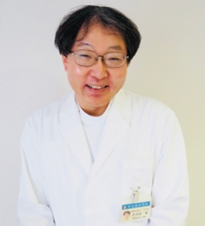
Jichi Medical University was established with the aim of improving medical care and welfare in the rural areas of Japan in 1972. As its sole affiliated hospital, Jichi Medical University Saitama Medical Center was developed in 1989 to realize the founding principles of the university. Equipped with the latest medical devices and excellent faculty dedicated to both clinical practice and medical education, Saitama Medical Center has served a central role in medical care in the Saitama area.
The center aims to integrate and practice “Generalized care aiming at the best outcome for the patients” and “Specialized care aiming at advanced medical care”. We had been conducting super-rotational training in multiple departments even before 2004 when the Ministry of Health, Labour, and Welfare announced residency training as mandatory. Supported by the extensive experience in resident training over 30 years, we have been providing residency training that not only matches the standards of the Ministry of Health, Labour, and Welfare but also nurtures physicians who can demonstrate excellent clinical abilities based on their profound humanity. Fortunately, our center is trusted by many patients, and through its care, residents can gain a wide range of clinical experience and become clinicians with a comprehensive perspective.
In addition, in order to meet the needs of the community, we added 200 beds in the south wing in April 2008 to enhance emergency, highly specialized care, and perinatal care. In April 2008, we opened Saitama Prefecture's eighth Emergency Medical Center, which also treats a large number of tertiary emergency patients.
At the center, the residents are called “Junior Residents (J)” in comparison to “Senior Residents (S)”, which is used to refer to fellows trained in the specialty training program. The term “Residents” is a combination of the terms “junior residents” and “senior residents”.
Susumu Ookawara, MD, PhD
Program Director
Jichi Medical University Saitama Medical Center Residency Program
The members of Residency Program / Postgraduate Clinical Training Office
Director:
Susumu Ookawara, MD, PhD (Nephrology)
Deputy Directors:
Yasuhiro Yamaguchi, MD, PhD (Pulmonology)
Hiroshi Noda, MD, PhD (Surgery)
Tomoyuki Kuwata, MD, PhD (Obstetrics and Gynecology)
Daisuke Sugawara, MD, PhD (Pediatrics)
Hidenori Sanayama, MD, PhD (General Internal Medicine)
Hiroyuki Tamura, MD (Emergency Medicine)
Reina Suzuki, MD (General Internal Medicine)
Advisor:
Hitoshi Sugawara, MD, PhD (General Internal Medicine)
Our educational goals and efforts
To nurture physicians with a comprehensive perspective, the Postgraduate Clinical Training Office at Jichi Medical University Saitama Medical Center provides various educational opportunities to complement bedside experiences. Specifically, “Dr. Fujimoto’s Educational Weeks” had been the signature of our program for as long as 20 years from 2004 through 2023. This wonderful educational opportunity was made possible by the enthusiasm of the 2nd director of the medical center Dr. Yasunori Kanazawa, who aspired to good education for residents, and Dr. Wilfred Y. Fujimoto (Professor Emeritus of the Department of Medicine Division of Metabolism and Endocrinology, University of Washington, WA, USA) kindly accepted this offer after he retired from UW. Based on his profound experiences in both clinical practice and research activities, Dr. Fujimoto had oriented our residents in clinical reasoning – which was new to Japanese residents when the program started in 2004 – and he trained more than 500 residents. All of those sessions were conducted in English. Dr. Fujimoto’s leaving our hospital was one of the saddest events we experienced in recent years, however, the committee launched a new program called “Case Based Learning (CBL) for residents” in April 2023 as an alternative educational opportunity.
CBL is an opportunity to learn clinical reasoning in Japanese, led by three young doctors in the Postgraduate Clinical Training Office who were trained by Dr. Fujimoto. Based on the strong belief that understanding in one’s own language is indispensable for any kind of fruitful discussion, CBL is purposely held in Japanese. It is our hope through the case discussions in their own language, residents should become familiar with the process of clinical reasoning and eventually be comfortable having case discussions even in English. Currently, we do not have any educational programs available in English, however, we are exploring ways to continue medical education in English to meet the needs of the expanding medical scene worldwide.
In addition, the program provides various educational opportunities during the two years of residency training, such as Immediate Cardiac Life Support (ICLS), suture practice, weekly case conferences, conference presentations, and writing papers, so that each individual can expand his or her potential depending on his or her motivations.
With the recent work style reforms propelled by the government, it is sometimes difficult to provide education that satisfies both the leadership and residents. However, we will continue to make our best efforts to provide the best possible education to our residents available at our medical center.
[Photos]
ICLS
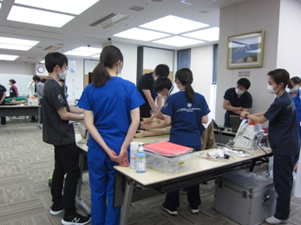
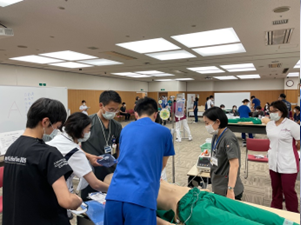
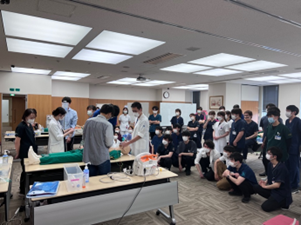
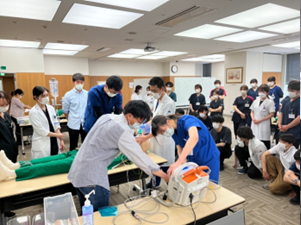
Suture lab
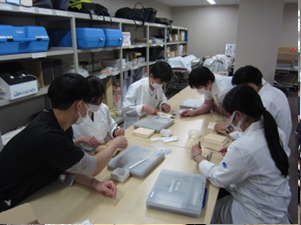
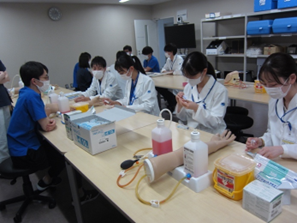
Dr. Fujimoto’s educational weeks

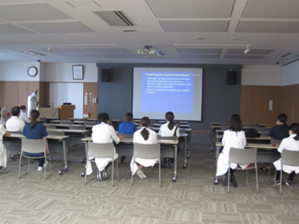
The educational opportunities provided by our residency program
1. Educational Weeks by Dr. Wilfred Y. Fujimoto (English, 2004-2023)
From 2004 to 2023 (interrupted by the COVID-19 outbreak during 2020-2022), Dr. Fujimoto stayed with us for two weeks every two months, six times a year, to provide direct guidance to our residents. During the educational weeks, residents had ample opportunities to present their cases at department conferences in English and Dr. Fujimoto gave constructive feedback to all of them. In the noon time, a lunch-on, case-based learning style conference called "Noon Conference" was held every day. In addition, the residents had the luxury of having a one-on-one session with Dr. Fujimoto. Although struggling with English, reviewing the management they provided to their patients under Dr. Fujimoto's guidance was a valuable experience for the residents.
At the farewell ceremony held in appreciation to Dr. Fujimoto’s long-year contributions to our resident education in September 2023, former directors of the center and professors who had been in close contact with Dr. Fujimoto were present to celebrate his new beginnings.
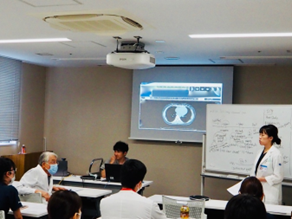
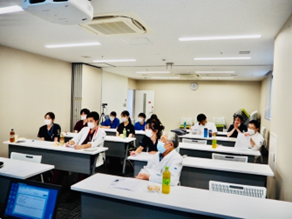
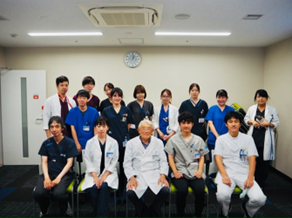
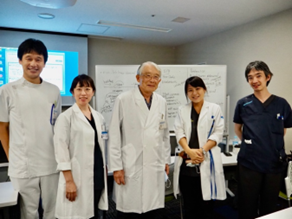
At Dr. Fujimoto’s last visit with us (September, 2023)
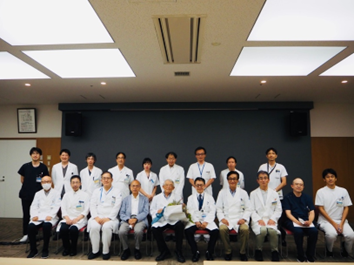
At the farewell ceremony for Dr. Fujimoto (September, 2023)
2. Online conferences with Dr. Fujimoto (English, 2020-2022)
When Dr. Fujimoto's visit to our center was interrupted due to the COVID-19 outbreak, we had online case conferences once or twice a month with Dr. Fujimoto.
3. Weekly case conferences (Japanese, 1989-current)
Weekly case conferences are held every Wednesday afternoon from 4 to 5 pm. Every week, two residents present and share interesting cases they have experienced in a conference format. After the resident presentations, a fellow or attending physician provides a mini-lecture on key topics the resident should be familiar of. This conference is another signature of the center, which has continued since the center’s establishment.
The portal site for physicians, m3.com, has featured those cases in its "Training Frontline" section.
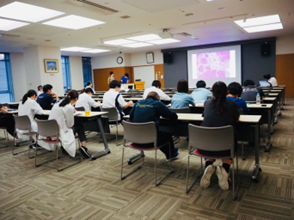
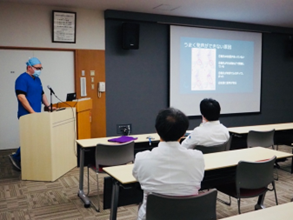
(Left: case presentation by a resident, Right: mini-lecture by an ENT fellow Dr. Sawa on tracheostomy tubes)
The links to the articles at m3.com (login credentials required for m3.com)
4. Immediate Cardiac Life Support (ICLS) (Japanese, 2017 to current)
As part of the orientation, we provide the new interns with ICLS training since 2017. The ICLS course is led by Dr. Kashiura and Dr. Tamura of the Department of Emergency Medicine. The training has been highly evaluated as meaningful by the participating residents.
Message from Dr. Masahiro Kashiura, ICLS Director:
To those of you who are considering residency training at Jichi Medical University Saitama Medical Center, I am Dr. Masahiro Kashiura, Director of the Department of Emergency Medicine. At this center, all of our interns are required to take a cardiopulmonary resuscitation course called ICLS (Immediate Cardiac Life Support) course.
The ICLS course focuses on practical skills training to learn how to respond to a sudden cardiac arrest in the first 10 minutes and to learn appropriate team resuscitation. When you become an intern and enter clinical practice, you may be required to manage code blue by yourself one day. Our ICLS course is usually held in April each year. This course is designed to help participants quickly become proficient in emergency response and cardiopulmonary resuscitation so that they can respond to emergencies without anxiety. We sincerely hope that our training program will help you grow and succeed.
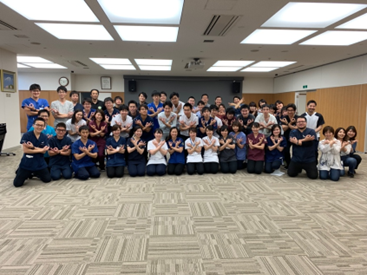
5. Case Based Learning for residents (Japanese, 2023-current)
The aim of the weekly CBL sessions starting in April, 2023 is to provide residents with the opportunities to learn clinical reasoning in a safe environment. Through detailed discussions on the case presented by the faculty, the residents learn how to take good history, gather information, make a solid problem list, come up with differential diagnoses, ordering tests, and making a diagnosis (and how to treat the condition). The sessions are guided by the three young faculty who were trained by Dr. Fujimoto during their residency/fellowship time. Most of the time the faculty members present the case but residents could utilize this opportunity to share an interesting case with their colleagues if they wish. CBL has become popular in Japanese medical schools, but our CBL program is unique in that we aim to provide an educational experience that is immediately useful in clinical practice by using “real” cases experienced by the faculty members or residents.
In addition to case discussions, lectures are provided as needed. The sessions are evaluated highly by the residents.
The voices of the participating residents:
"An opportunity to share opinions in an interactive manner is much more valuable than video lectures.”
"A valuable opportunity to learn from real cases.”
"The sessions are well designed for the early learners like us, and they are easy to understand.”
"The lectures are very informative.”
"The hands-on sessions are also practical and easy to understand.”
The sessions are held every Friday from 12 to 1 pm, except for holidays.
We welcome visitors to our program and invite anyone who is interested to come and see our live education.
>>Contact
TEL:+81-48-648-5225 (Direct)
mail:rinshoukenshu2@omiya.jichi.ac.jp
The lectures conducted in the past
Lectures by CBL faculty: Diagnostic imaging of head MRI (Dr. Sanayama), Epilepsy (Dr. Sanayama), How to write a referral (Dr. Tamura), Introduction to point-of-care ultrasonography (Dr. Suzuki), IV fluid therapy not covered in textbooks (Dr. Suzuki) Special lectures: How to search for scientific articles (Dr. Shiotsuka, Department of Anesthesiology and Critical Care Medicine), Airway emergencies (Dr. Mori, Department of Emergency Medicine)
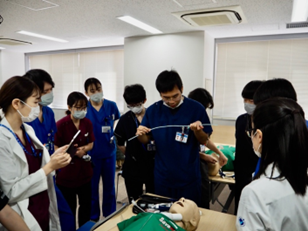
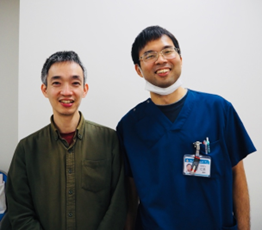
Special Lecture “Airway Emergencies” by Emergency fellow Dr. Mori
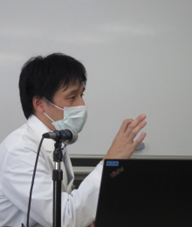
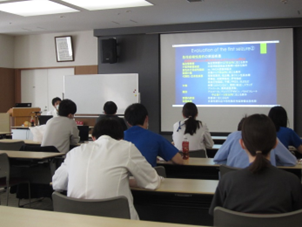
Special Lecture "Epilepsy" by CBL faculty Dr. Sanayama